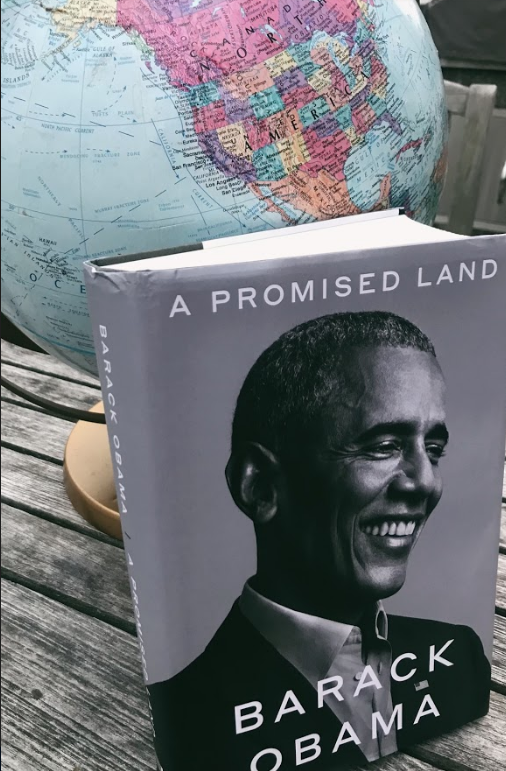“The World As It Should Be”
“The world as it is, and the world as it should be.”
Whether you are concerned about current political division, studying US History or US Gov, seeking to understand the meaning of leadership, or simply searching for an introspective read, A Promised Land offers insight on how to unify and return to our ideals as a democracy. President Obama’s memoir, the first of two volumes, covers his campaign and most of his first term in the White House.
Obama’s voice in the memoir, while carrying definite ethos, is colored with self-awareness and a certain self-doubt. In the book’s early pages, he reflects on the complexities of his racial identity and his “preference for navel-gazing over action” as a Harvard intellectual. He questions his motives in entering politics and whether they were truly altruistic: “Was I still trying to prove myself worthy to a father who had abandoned me, live up to my mother’s starry-eyed expectations of her only son, and resolve whatever doubt remained from being born a child of mixed race?”
The book also reflects the gulf between the America of 2008 and the America of 2021. The positions on race that Obama took during his campaign and presidency, while they alienated a bloc of voters, were intended to heal rather than divide. Obama mostly steers clear of the issue of race in A Promised Land, perhaps reflecting his desire to straddle both the worlds of white America and Black America, and both facets of his mixed-race identity. He does reflect on the controversy that unfolded after the arrest of Professor Henry Louis Gates, Jr., and how his comment during a press conference—“the Cambridge police acted pretty stupidly in arresting somebody when there was already proof that they were in their own home”—caused an uproar among white voters. After a summer of protests and discussions of police brutality, this comment does not seem foreign. And while the “emotional, almost visceral reaction to [his] presidency” may appear racially motivated in retrospect, Obama notes that he was careful not to label his opponents racist.
Obama reflects on his dream to bridge the racial divides of the nation and create opportunities for citizens of all different backgrounds. When he stated that “the world will start looking at America differently” due to his presidency, I was reminded of Vice-President elect Kamala Harris’ acceptance speech and how each of their elections were historic moments for this country. “I know that kids all around this country–Black kids, Hispanic kids, kids who don’t fit in–they’ll see themselves differently, too, their horizons lifted, their possibilities expanded.”
A Promised Land articulates a clear perspective on American progress: Despite America’s perpetual inability to live up to our ideals of freedom and equality, we can still strive toward the promise of America, the “arc of democracy.” Obama’s belief in American exceptionalism contrasts with recent views that America’s ideals are irredeemably tied with racism and oppression. It is Obama’s “audacity of hope” for America that unifies the book throughout its 701 pages, the belief that “yes we can.” In the face of skyrocketing unemployment, the Deepwater Horizon oil spill, and the countless other struggles of his presidency, Obama never loses faith in the ability of America to overcome these setbacks and remains steadfast in his vision of change for the nation.
The pages of A Promised Land are graced not only with accounts of political deliberations, but also the stories of real people: voters without health insurance, the wounded soldiers the President visited at Walter Reed Military Hospital, members of the cabinet, foreign leaders, and political opponents. Obama describes his chief of staff, Pete Rouse, as “almost shy, which helped explain his long-term bachelorhood and doting affection for his cats.” He tells of “the single mom living on a ravaged block who somehow got all four children through college.” In one biographical sketch, he notes the struggle that Senate Democratic leader Harry Reid had to endure to reach Congress, beginning his life “in a shack without indoor plumbing or a telephone.” Obama ties these moments of prose into the narrative of the decisions he made to reach the presidency and the policies he enacted in his first term. The book does not read as the voice of a distant politician but instead as a fellow citizen, a leader who recognizes that democracy is fundamentally vested in the people.
A Promised Land describes a democracy in transition and conflicted about its principles and role in the world. A political sphere oscillating between globalism and nationalism, a housing boom and financial crisis, bipartisanship and partisan obstruction, conservatism and progressivism, war and peace, racial resentment and the hope for a post-racial society. Obama is honest about the shifts in his own perceptions of democracy, which emerges as the memoir’s most profound strength.
Regardless of your political affiliation, I would recommend reading A Promised Land for the window that it offers into identity: the identity of the 44th President and our identity as a democracy, a “promised land.” Neither one is perfect. Indeed, Obama asserts this truth through his ponderous reflections on both the successes and failures of his presidency, his persistent humility and self-doubt, and his realization that he had become an “outsized symbol of hope” for the nation. The memoir is not only the account of a single public figure or administration but becomes the question of a nation. What tensions and struggles have formed the world as it is? Is it possible to shape our democracy into what it should be?

Harper is the current Editor in Chief of Prospect. Harper served as the Opinions Editor of the paper during the 2019-2020 school year. This is her fourth...





